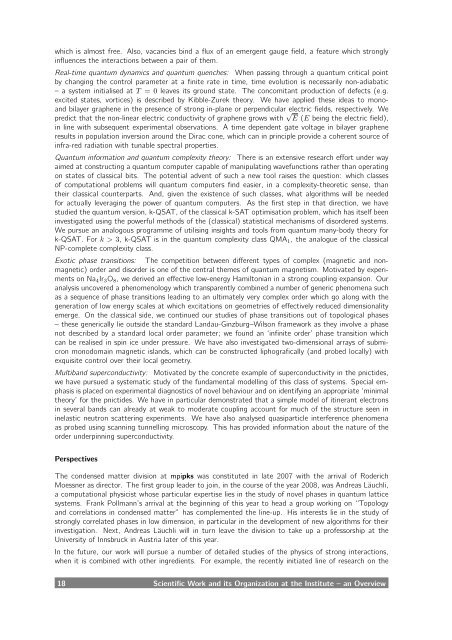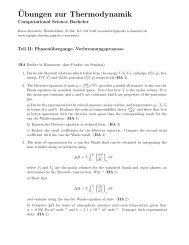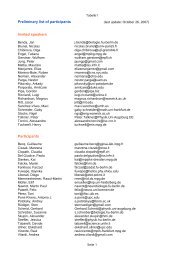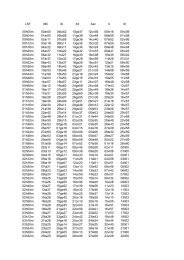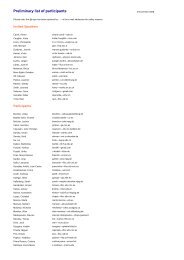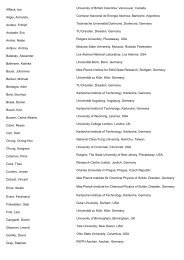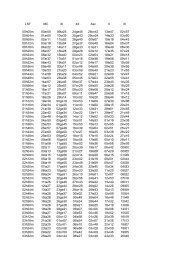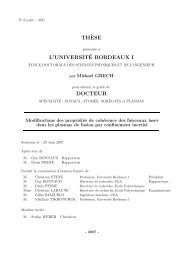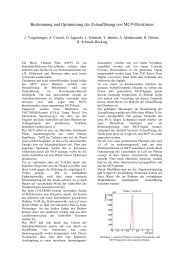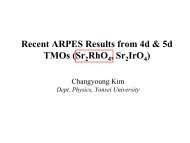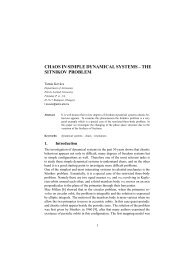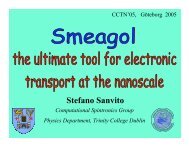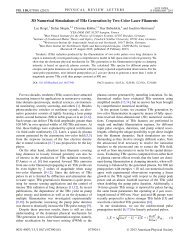Contents - Max-Planck-Institut für Physik komplexer Systeme
Contents - Max-Planck-Institut für Physik komplexer Systeme
Contents - Max-Planck-Institut für Physik komplexer Systeme
Create successful ePaper yourself
Turn your PDF publications into a flip-book with our unique Google optimized e-Paper software.
whichisalmostfree. Also,vacanciesbindafluxofanemergentgaugefield,afeaturewhichstrongly<br />
influencestheinteractionsbetweenapairofthem.<br />
Real-timequantumdynamicsandquantumquenches: Whenpassingthroughaquantumcriticalpoint<br />
bychangingthecontrolparameteratafiniterateintime,timeevolutionisnecessarilynon-adiabatic<br />
–asysteminitialisedat T = 0leavesitsgroundstate. Theconcomitantproductionofdefects(e.g.<br />
excitedstates,vortices)isdescribedbyKibble-Zurektheory. Wehaveappliedtheseideastomonoandbilayergrapheneinthepresenceofstrongin-planeorperpendicularelectricfields,respectively.<br />
We<br />
predictthatthenon-linearelectricconductivityofgraphenegrowswith √ E(Ebeingtheelectricfield),<br />
inlinewithsubsequentexperimentalobservations. Atimedependentgatevoltageinbilayergraphene<br />
resultsinpopulationinversionaroundtheDiraccone,whichcaninprincipleprovideacoherentsourceof<br />
infra-redradiationwithtunablespectralproperties.<br />
Quantuminformationandquantumcomplexitytheory: Thereisanextensiveresearcheffortunderway<br />
aimedatconstructingaquantumcomputercapableofmanipulatingwavefunctionsratherthanoperating<br />
onstatesofclassicalbits. Thepotentialadventofsuchanewtoolraisesthequestion: whichclasses<br />
ofcomputationalproblemswillquantumcomputersfindeasier,inacomplexity-theoreticsense,than<br />
theirclassicalcounterparts. And,giventheexistenceofsuchclasses,whatalgorithmswillbeneeded<br />
foractuallyleveragingthepowerofquantumcomputers. Asthefirststepinthatdirection,wehave<br />
studiedthequantumversion,k-QSAT,oftheclassicalk-SAToptimisationproblem,whichhasitselfbeen<br />
investigatedusingthepowerfulmethodsofthe(classical)statisticalmechanismsofdisorderedsystems.<br />
Wepursueananalogousprogrammeofutilisinginsightsandtoolsfromquantummany-bodytheoryfor<br />
k-QSAT.For k > 3,k-QSATisinthequantumcomplexityclassQMA1,theanalogueoftheclassical<br />
NP-completecomplexityclass.<br />
Exoticphasetransitions: Thecompetitionbetweendifferenttypesofcomplex(magneticandnonmagnetic)orderanddisorderisoneofthecentralthemesofquantummagnetism.MotivatedbyexperimentsonNa4Ir3O8,wederivedaneffectivelow-energyHamiltonianinastrongcouplingexpansion.Our<br />
analysisuncoveredaphenomenologywhichtransparentlycombinedanumberofgenericphenomenasuch<br />
asasequenceofphasetransitionsleadingtoanultimatelyverycomplexorderwhichgoalongwiththe<br />
generationoflowenergyscalesatwhichexcitationsongeometriesofeffectivelyreduceddimensionality<br />
emerge. Ontheclassicalside,wecontinuedourstudiesofphasetransitionsoutoftopologicalphases<br />
–thesegenericallylieoutsidethestandardLandau-Ginzburg–Wilsonframeworkastheyinvolveaphase<br />
notdescribedbyastandardlocalorderparameter;wefoundan‘infiniteorder’phasetransitionwhich<br />
canberealisedinspiniceunderpressure. Wehavealsoinvestigatedtwo-dimensionalarraysofsubmicronmonodomainmagneticislands,whichcanbeconstructedliphografically(andprobedlocally)with<br />
exquisitecontrolovertheirlocalgeometry.<br />
Multibandsuperconductivity: Motivatedbytheconcreteexampleofsuperconductivityinthepnictides,<br />
wehavepursuedasystematicstudyofthefundamentalmodellingofthisclassofsystems.Specialemphasisisplacedonexperimentaldiagnosticsofnovelbehaviourandonidentifyinganappropriate‘minimal<br />
theory’forthepnictides.Wehaveinparticulardemonstratedthatasimplemodelofitinerantelectrons<br />
inseveralbandscanalreadyatweaktomoderatecouplingaccountformuchofthestructureseenin<br />
inelasticneutronscatteringexperiments. Wehavealsoanalysedquasiparticleinterferencephenomena<br />
asprobedusingscanningtunnellingmicroscopy. Thishasprovidedinformationaboutthenatureofthe<br />
orderunderpinningsuperconductivity.<br />
Perspectives<br />
Thecondensedmatterdivisionat mpipkswasconstitutedinlate2007withthearrivalofRoderich<br />
Moessnerasdirector.Thefirstgroupleadertojoin,inthecourseoftheyear2008,wasAndreasLäuchli,<br />
acomputationalphysicistwhoseparticularexpertiseliesinthestudyofnovelphasesinquantumlattice<br />
systems. FrankPollmann’sarrivalatthebeginningofthisyeartoheadagroupworkingon“Topology<br />
andcorrelationsincondensedmatter”hascomplementedtheline-up. Hisinterestslieinthestudyof<br />
stronglycorrelatedphasesinlowdimension,inparticularinthedevelopmentofnewalgorithmsfortheir<br />
investigation. Next,AndreasLäuchliwillinturnleavethedivisiontotakeupaprofessorshipatthe<br />
UniversityofInnsbruckinAustrialaterofthisyear.<br />
Inthefuture,ourworkwillpursueanumberofdetailedstudiesofthephysicsofstronginteractions,<br />
whenitiscombinedwithotheringredients. Forexample,therecentlyinitiatedlineofresearchonthe<br />
18 ScientificWorkanditsOrganizationatthe<strong>Institut</strong>e–anOverview


